Rundown and Form
This sonnet previously showed up in the 1856 version and accepted its last adjustments for the 1881 release. While “Intersection Brooklyn Ferry,” like the greater part of Whitman’s sonnets, contains minimal in the method of a describable proper design, it includes a lot of arbitrary inside patternings made by the redundancy of words and expressions. This feeling of reiteration and returning to builds up the topical substance of the sonnet, which takes a gander at the chance of progression inside humankind dependent on normal encounters.
Analysis
This sonnet tries to decide the relationship of individuals to each other across reality. Whitman thinks about what he implies (not as an artist but rather as another unknown individual) to the hordes of outsiders he sees each day. He accepts that they see exactly the same things he does, and that they respond similarly, and that this unites them undeniably. This is not quite the same as the “what I expect you will accept” philosophy of “Melody of Myself.” Here Whitman’s feeling of shared spaces and shared encounters is likened to that of the Romantics, to be specific Wordsworth and Coleridge. This sonnet can be beneficially contrasted with Wordsworth’s “Tintern Abbey” and Coleridge’s “This Lime-tree Bower.” In both of those sonnets somebody imperative to the writer—Wordsworth’s sister, Coleridge’s companion—is assumed to a position that has been essential to the artist. Wordsworth goes with his sister, and can take thoroughly enjoy seeing her recurrent his experience. Coleridge can’t go with his companion, be that as it may, and he sits at home, contemplating whether his companion’s experience will have any importance for both of them. While Wordsworth is more worried about the possibility of the force of spot, Coleridge, similar to Whitman, is more inspired by the importance of shared insight, and its capacity to conceivably rise above obstructions of room and mortality.
In the end Whitman appears to give more assurance to shared insight than Coleridge does. Advising himself that others have seen, and fifty years from now will in any case be seeing, the islands of New York City, he understands that others have additionally shared his scope of passionate and profound experience. This makes him huge as an individual yet in addition part of a bigger entirety. Inquisitively this leads Whitman to go to the physical as a locus for character: “I too had receiv’d personality by my body,/That I was I knew was of my body, and what I ought to be I realized I ought to be of my body.” The body is both a vehicle for singular explicitness and a methods by which to participate in like manner experience: it is the place where oneself and the world meet up.
In his depiction of the New York waterfront Whitman doesn’t separate between the normal and the man-made. Steamships and structures are portrayed in similar terms as seagulls and waves. This is by all accounts Whitman’s gesture to authentic particularity, which can upset coherence of involvement. Fifty years before Whitman’s ship crossing, the steamships and the horizon were not there, and he knows this. It is these minor changes that empower him to be explicit, and that permit viewpoint on human life.
Urdu Summary
یہ نظم پہلی بار 1856 کے ایڈیشن میں شائع ہوئی اور 1881 کے ایڈیشن کے لئے اسے آخری ترمیم ملی۔ جبکہ وائٹ مین کی بیشتر نظموں کی طرح ، “بروکلین فیری کو عبور کرنا ،” بھی قابل ذکر رسمی ڈھانچے کی طرح بہت کم ہے ، اس میں الفاظ اور فقروں کی تکرار کے ذریعہ تخلیق کردہ بے ترتیب اندرونی نمونوں کا ایک بہت بڑا نمونہ ہے۔ تکرار اور نظر ثانی کا یہ احساس نظم کے موضوعاتی مواد کو تقویت دیتا ہے ، جو مشترکہ تجربات کی بنا پر انسانیت کے اندر تسلسل کے امکان کو دیکھتا ہے۔
Analysis
یہ نظم زمان و مکان میں انسانوں کے ایک دوسرے سے تعلقات کا تعین کرنے کی کوشش کرتی ہے۔ وائٹ مین حیرت زدہ ہے کہ اس کا کیا مطلب ہے (بطور شاعر نہیں بلکہ ایک اور گمنام فرد کی حیثیت سے) اجنبیوں کے ہجوم کے لئے جسے وہ ہر روز دیکھتا ہے۔ وہ فرض کرتا ہے کہ وہ وہی چیزیں دیکھتے ہیں جو وہ کرتا ہے ، اور یہ کہ وہ بھی اسی طرح سے رد عمل ظاہر کرتے ہیں ، اور یہ انھیں ایک حقیقی معنوں میں اکٹھا کرتا ہے۔ یہ “گانا آف مائی سیلف” کے کوڈو کے “میرے خیال میں آپ کو فرض کریں گے” سے مختلف ہے۔ یہاں وٹ مین کے مشترکہ جگہوں اور مشترکہ تجربات کا احساس رومانٹک جیسے ورڈز ورتھ اور کولریج سے ملتا جلتا ہے۔ اس نظم کا منافع ورڈز ورتھ کے “ٹنٹرن ایبی” اور کولریج کے “یہ چونے کے درختوں کی طاقت” کے ساتھ کیا جاسکتا ہے۔ ان دونوں اشعار میں ، شاعر کے لئے کوئی اہم شخص — ورڈز ورتھ کی بہن ، کولریج کی دوست a کو ایک ایسی جگہ لے جایا گیا جو شاعر کے لئے اہم رہا ہے۔ ورڈز ورتھ اپنی بہن کے ساتھ ہیں ، اور اسے اپنے تجربے کو دہراتے ہوئے خوشی محسوس کرنے میں کامیاب ہیں۔ کولریج اپنے دوست کے ساتھ نہیں جاسکتے ہیں ، اور وہ گھر بیٹھے سوچتے ہیں کہ آیا اس کے دوست کے تجربے میں ان دونوں میں سے کوئی معنی ہوگا۔ اگرچہ ورڈز ورتھ مقام کی طاقت کے خیال سے زیادہ وابستہ ہیں ، کولرج ، وہٹ مین کی طرح ، مشترکہ تجربے کی مطابقت میں زیادہ دلچسپی رکھتے ہیں ، اور اس کی جگہ اور اموات کی رکاوٹوں کو ممکنہ طور پر عبور کرنے کی صلاحیت ہے۔
آخر میں لگتا ہے کہ کولٹریج کے مقابلے میں وائٹ مین مشترکہ تجربے کو زیادہ ساکھ دیتا ہے۔ اپنے آپ کو یاد دلاتے ہوئے کہ دوسروں نے دیکھا ہے ، اور اب سے پچاس سال بعد ، نیو یارک شہر کے جزیرے ، یہ دیکھ رہے ہیں کہ دوسروں نے بھی اس کے جذباتی اور روحانی تجربات کا اشتراک کیا ہے۔ اس سے وہ ایک فرد کی حیثیت سے نمایاں بلکہ ایک بڑے پورے کا حصہ بھی بن جاتا ہے۔ حیرت کی بات یہ ہے کہ شناخت کے ل وہٹ مین جسمانی طور پر لوکس کی طرف راغب ہوتا ہے: “میں نے بھی اپنے جسم سے شناخت حاصل کی تھی ، / جس سے میں جانتا تھا کہ وہ میرے جسم کا تھا ، اور مجھے کیا ہونا چاہئے میں جانتا تھا کہ میں اپنے ہونا چاہئے۔ جسم.” جسم انفرادی خصوصیت اور ایک ذریعہ ہے جس کے ذریعہ مشترکہ تجربے میں حصہ لینا دونوں ایک گاڑی ہے۔ یہ وہ مقام ہے جہاں خود اور دنیا ایک ساتھ ہوتے ہیں۔
نیو یارک کے واٹر فرنٹ کی اپنی وضاحت میں وہٹ مین قدرتی اور انسان ساختہ کے درمیان فرق نہیں کرتا ہے۔ بھاپ جہازوں اور عمارتوں کو سیگولس اور لہروں کی طرح ایک ہی اصطلاح میں بیان کیا گیا ہے۔ ایسا لگتا ہے کہ یہ وائٹ مین کی تاریخی خصوصیات کے لئے رضامندی ہے ، جو تجربے کے تسلسل میں خلل ڈال سکتی ہے۔ وہائٹ مین کے فیری کراسنگ سے پچاس سال پہلے ، بھاپ اور آسمانی لائن وہاں موجود نہیں تھی ، اور اسے یہ معلوم ہے۔ یہ چھوٹی چھوٹی تبدیلیاں ہی اس کو مخصوص ہونے کا اہل بناتی ہیں ، اور اس سے انسان کے وجود کے بارے میں نقطہ نظر کی اجازت ملتی ہے۔
© 2021 Niazi TV – Education, News & Entertainment










